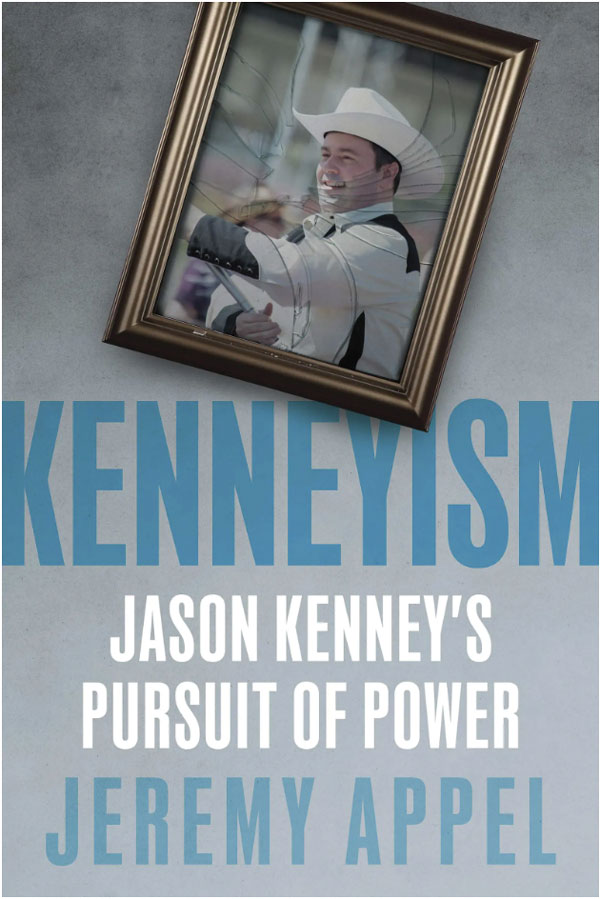Kenneyism, by journalist Jeremy Appel, is the definitive political biography of former Alberta premier Jason Kenney. It’s a wild ride, propelling the reader through three decades of the often shady antics of a political maverick until his rapid fall and disappearance from public life.
Seen through Appel’s retrospective lens, Kenney’s rise is relentless. In high school Kenney dreamt of becoming prime minister. In college “the young zealot” dabbled in anti-gay and pro-life activism. As a rising conservative star, he palled with fellow “snackpackers” Ezra Levant and Rahim Jaffer. Jaffer dubbed Kenney “minister curry in a hurry” for his habit of wooing the immigrant vote at ethnocultural events in aid of Stephen Harper’s eventual majority win. Once he became Minister of Citizenship and Immigration, Kenney’s open arms proved selective. While boasting of increasing immigration quotas, he created roadblocks to family reunification and stated his preference for “high-value innovators.” This bait-and-switch behaviour is a recurring theme throughout his rise to power.
Appel quips that Premier Kenney’s “war room was too absurd not to write about.” As I read the book, I decided one might say the same about nearly everything Kenney did. Driving into Alberta in his blue pickup, Kenney set to work winning the vote of the working class. As premier he waged war on the very institutions the working class depend upon, and single-mindedly “reduced burdens on big business.” Kenney’s Act to Repeal the Carbon Tax turned out to be hustle too. He axed the tax, which was immediately replaced by a federal one, costing the province $1.3-billion in annual revenue and allowing Kenney to self-righteously point his finger at the feds—absurd indeed.
Appel’s astute analysis, understanding of the neoconservative agenda and on-point references make Kenneyism an engaging—if often troubling—read. Kenney’s response to the drug-poisoning epidemic was governed by his “strict moralism.” Subsidized private, abstinence-based recovery clinics became the go-to solution as harm reduction sites in Alberta were shut down and the provincial government demonized safe supply. An absence of data now cloaks this issue. While Kenney’s ideology governed his approach to drug rehabilitation, his response to the pandemic “was an incoherent mess.” Appel concludes that on several fronts Kenney’s government put policies into practice “that did incalculable harm.”
Drawing from his experience covering Kenney-era politics, Appel also offers insightful analysis of the province’s relationship with its petroleum wealth. On the hypocrisy and subservience to industry demonstrated by successive governments, he writes, “[Alberta] didn’t become [a petrostate] by letting the free market do its work. It got that way by putting the thumb of the state on the scale in favour of the oil and gas industry, conflating the collective interests of Albertans with companies that seek to… rob the population blind”—a concise summary of the predicament of our oil-dependent province.
Tying together the threads that define Kenney, Appel concedes that the man is “a deep political thinker” driven by an inner compass that orients toward materialism and authoritarianism. He may have used “populist framing” as the means, but Kenney’s singular goal was to strengthen the interests of “the very elites he raged against”—and therefore his own. Appel’s review of Kenney’s politicking provides a chilling tableau of the former UCP leader’s strategy and personal ideology. Kenney shifted “the contours of political debate rightward,” showing us the trajectory of the emergent “New Right agenda.” I may have lived through these events, but I was still left shaken.
For this self-proclaimed lefty, Kenneyism is a well-researched, comprehensive journey down a nightmarish memory lane of jingoist bugaboos and populist demons. It’s a compelling look at our times for anyone concerned about our future.
Roberta Laurie teaches communication studies at MacEwan University and is the author of Weaving a Malawi Sunrise.
_______________________________________


